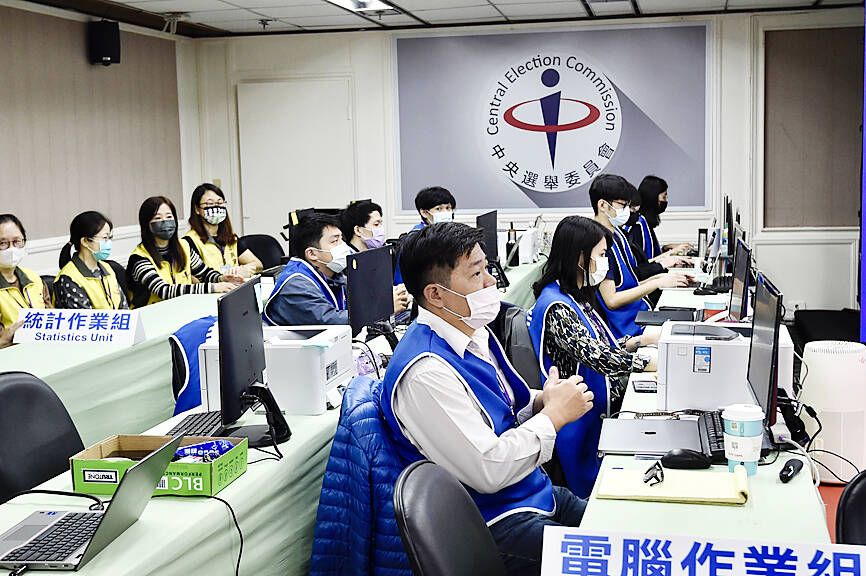The Central Election Commission (CEC) yesterday reminded the public that no campaigning is allowed after midnight, with offenders subject to a fine of up to NT$5 million (US$161,786).
A day before voters were set to cast ballots for the heads of cities and counties and other local offices, CEC Chairman Lee Chin-yung (李進勇) told a news conference in Taipei that all “public campaigning activities,” such as open rallies, had to end by 10pm yesterday.
No election activities — public or private — would be allowed after midnight, and violators would face fines ranging from NT$500,000 to NT$5 million, Lee said.

Photo: George Tsorng, Taipei Times
Given the popularity of social media, CEC Deputy Chairman Chen Chao-chien (陳朝建) reminded people that they are prohibited from displaying on social media profile pictures that deliver an election message after midnight.
Those who do could also be fined up to NT$5 million, Chen said.
In addition to the local elections, voters are to cast their ballots in a referendum to lower the voting age to 18 from 20.
Lee said that anybody other than candidates in the elections would still be allowed to post messages supporting their positions on the referendum today, but information on a candidate cannot be used in any messages on the referendum.
More than 11,000 positions at all levels of local governments will be up for grabs today.
Those eligible to vote can cast ballots from 8am to 4pm. The CEC did not say when the results of the different races would come out, but Lee said the commission would try its best to complete the vote count by the end of today.
There will be 17,649 polling stations across the nation staffed by more than 300,000 election workers to ensure a smooth voting process and the quick counting of ballots, Lee said.
Voters are not allowed to take ballots out of the polling stations or they will face a jail term of up to one year or a fine of up to NT$15,000, Lee said.
A total of 19.13 million Taiwanese are eligible to vote in the elections, including 760,000 first-time voters, while a total of 19.24 million can vote in the referendum, the CEC said.
However, those who tested positive for COVID-19 from Monday onward are not allowed to vote, as they have to isolate for five days.
At a separate news conference, the Central Epidemic Command Center (CECC) estimated that about 65,000 citizens with COVID-19 would not be able to exercise their right to vote due to the five-day isolation mandate.
Deputy Minister of Health and Welfare Victor Wang (王必勝), head of the CECC, said that while more than 66,000 cases had been reported from Tuesday to yesterday, an estimated 10,000 more cases reported today would bring the total to 80,000 people who would be undergoing five-day isolation on election day.
As about 80 percent of these people have the right to vote, that means about 65,000 would be unable to cast their ballots, Wang said.
Asked if there would be many hidden cases who did not report their condition in order to vote, Wang dispelled the concern, saying that the total number of infections this week is expected to be between 105,000 and 110,000, which is in line with the declining trend so far.

Taiwanese can file complaints with the Tourism Administration to report travel agencies if their activities caused termination of a person’s citizenship, Mainland Affairs Council Minister Chiu Chui-cheng (邱垂正) said yesterday, after a podcaster highlighted a case in which a person’s citizenship was canceled for receiving a single-use Chinese passport to enter Russia. The council is aware of incidents in which people who signed up through Chinese travel agencies for tours of Russia were told they could obtain Russian visas and fast-track border clearance, Chiu told reporters on the sidelines of an event in Taipei. However, the travel agencies actually applied

Japanese footwear brand Onitsuka Tiger today issued a public apology and said it has suspended an employee amid allegations that the staff member discriminated against a Vietnamese customer at its Taipei 101 store. Posting on the social media platform Threads yesterday, a user said that an employee at the store said that “those shoes are very expensive” when her friend, who is a migrant worker from Vietnam, asked for assistance. The employee then ignored her until she asked again, to which she replied: "We don't have a size 37." The post had amassed nearly 26,000 likes and 916 comments as of this

New measures aimed at making Taiwan more attractive to foreign professionals came into effect this month, the National Development Council said yesterday. Among the changes, international students at Taiwanese universities would be able to work in Taiwan without a work permit in the two years after they graduate, explainer materials provided by the council said. In addition, foreign nationals who graduated from one of the world’s top 200 universities within the past five years can also apply for a two-year open work permit. Previously, those graduates would have needed to apply for a work permit using point-based criteria or have a Taiwanese company

The Shilin District Prosecutors’ Office yesterday indicted two Taiwanese and issued a wanted notice for Pete Liu (劉作虎), founder of Shenzhen-based smartphone manufacturer OnePlus Technology Co (萬普拉斯科技), for allegedly contravening the Act Governing Relations Between the People of the Taiwan Area and the Mainland Area (臺灣地區與大陸地區人民關係條例) by poaching 70 engineers in Taiwan. Liu allegedly traveled to Taiwan at the end of 2014 and met with a Taiwanese man surnamed Lin (林) to discuss establishing a mobile software research and development (R&D) team in Taiwan, prosecutors said. Without approval from the government, Lin, following Liu’s instructions, recruited more than 70 software